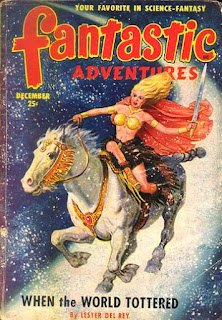Lester Del Rey’s 1950 novel When the World Tottered, published in Fantastic Adventures in December 1950, is one of many attempts to combine ancient mythology with science fiction.
Lester Del Rey (1915-1993) was a fairly prolific American science fiction writer.
The novel begins at un unspecified time but probably a few years into the future. Leif Svensen is a farmer living in the United States. He is of Scandinavian descent, which is important. The world is undergoing some sort of crisis. Particularly harsh winters, crop failures, food shortages. Things are growing rather tense. And people have reported seeing women riding through the air on horseback, which Leif attributes to hysteria.
Leif is involved in a dispute with his neighbours over his dog Lobo which has been accused of killing livestock. Things come to a head, there is an attempt to Lynch Leif and his twin brother Lee, an attempt which ends in a violent fight. Leif remembers being struck a savage blow.
Leif wakes up to discover that he is no longer on Earth. He is in Asgard, the home of the Norse gods. He was brought there by a Valkyrie. The task of the Valkyries of course is to carry heroes killed in combat to Asgard. It seems that Leif is such a fallen hero.
That’s disturbing enough, but it’s worse than that. The time for Ragnarok is approaching. All will be destroyed, including the gods themselves. It is their inescapable destiny.
Leif has his doubts about that. He comes to the conclusion that these gods among whom he now finds himself really were the origins of Norse mythology, but he suspects that they are simply beings from another dimension, one of several such alternate dimensions. They really are gods, the giants with whom the gods will do battle really do exist, but Leif is not convinced that their destiny is written in stone. Maybe he can change it. It might help if the gods had better weaponry. Spears and swords and battle-axes and Thor’s hammer all very well, but grenades might give the gods more of an edge.
Of course the odds would be even better if he had some Uranium-235 but there’s no chance of that. Until one of the dwarf smiths who serves the gods informs him that he can create an almost limitless supply of that element.
Loki, the notorious trickster god, also has doubts about the inevitability of fate. He also has plans to change the destiny of the gods. Maybe he and Leif can come up with a plan. Naturally a lot depends on whether Leif can trust Loki.
There’s another complication for Leif. He has fallen in love with a pretty Valkyrie, Fulla.
This novel seems on the surface to be fantasy but really it’s science fiction. Asgard is simply another dimension in which the rules are different. It just happens to be a dimension in which certain things are possible which would be considered magic on Earth. These gods are immortal beings but whether they are gods or not is an open question.
There’s no shortage of action. Leif is trapped in the world of the frost giants and must battle his way to freedom. Ragnarok is to involve a mighty battle, and that’s what happens. It’s a bloody battle indeed. The gods believe they will lose, because Fate has decreed that they will lose. Leif intends to win the battle.
There’s plenty here to please fans of action and mayhem, and plenty to please science fiction fans who want imaginative speculation about other worlds.
It’s all very entertaining. Highly recomended.
Armchair Fiction have reissued this one in one of their two-novel paperback editions, paired with Ice City of the Gorgon by Richard S. Shaver and Chester S. Geier (a book that deals with a somewhat similar theme).
I’ve also reviewed Lester Del Rey’s Pursuit, a very different kind of science fiction novel but a very good one.

No comments:
Post a Comment